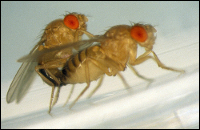 |
**__Related stories:__***linkurl:Fly sex peptide flips behavior;http://www.the-scientist.com/news/display/53981/
[10th December 2007]*linkurl:Drosophila's sex peptide;http://www.the-scientist.com/article/display/21480/
[22nd July 2003]*linkurl:Killing me softly with his sperm;http://www.the-scientist.com/article/display/19276/
[20th November 2000]




















